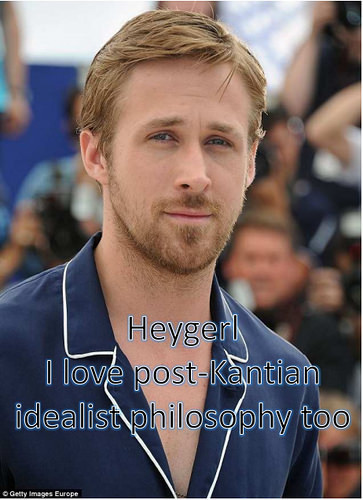What do you think?
Rate this book


544 pages, Hardcover
First published January 1, 1807


When Spirit is at first conceived of as substance in the element of pure thought, it is immediately simple and self-identical, eternal essence, which does not, however, have this abstract meaning of essence, but the meaning of absolute spirit. Only Spirit is not a 'meaning' is not what is inner, but what is actual. - pp 464-65, paragraph 769
...consciousness no longer aims to find itself immediately, but to produce itself by its own activity. It is itself the End at which its action aims, whereas in its role of observer it was concerned only with things. - pp 209, bottom of paragraph 344
[Miller's page 210] [....] the same conjunction of the high and the low which, in the living being, Nature naively expresses when it combines the organ of its highest fulfilment, the organ of generation, with the organ of urination [Organs des Pissens]. The infinite judgement, qua infinite, would be the fulfilment of life that comprehends itself; the consciousness of the infinite judgement that remains at the level of picture-thinking behaves as urination [als Pissen].. I.e., "Pissen", not "Urinieren, the old dusty school=Latin ; Harris commenting, "Academic dog-Latin belongs to the old world of spiritual authority. In the 'daylight of the present' even philosophic science must speak the language of the people." Then his endnote (which is not a footnote), "I was amused to discover that the N.E.D. [I don't know what this is] calls Findlay's super-professorial use of 'micturition,' for urination, erroneous. His substitution of 'orgasm' for Hegel's 'generation' [...] is philosophically 'erroneous' also, but it led Alan White to the insightful comment that the 'I=I' of primitive Self-Consciousness is a philosophical orgasm." I think Joyce would've much enjoyed this little passage.....
After we came out of the church, we stood talking for some time together of Bishop Berkeley's ingenious sophistry to prove the nonexistence of matter, and that every thing in the universe is merely ideal. I observed, that though we are satisfied his doctrine is not true, it is impossible to refute it. I never shall forget the alacrity with which Johnson answered, striking his foot with mighty force against a large stone, till he rebounded from it -- "I refute it thus."Add to this Hegel's refutations of Physiognomy and Phrenology thusly ::
[page 193 in Miller] Lichtenberg [...] also says this: 'If anyone said, "You certainly act like an honest man, but I see from your face that you are forcing yourself to do so and are a rogue at heart"; without a doubt, every honest fellow to the end of time, when thus addressed, will retort with a box on the ear.' This retort is to the point, because it refutes the primary assumption of such a 'science' of mere subjective opinion, viz. that the reality of a man is his face, etc. The true being of a man is rather his deed; in this the individual is actual, and it is the deed that does away with both aspects of what is [merely] 'meant' to be [...]Etc. And the refutation of phrenology gets even more violent. Viz.
[Miller's page 205] When, therefore, a man is told 'You (your inner being) are this kind of person because your skull-bone is constituted in such and such a way,' this means nothing else than, 'I regard a bone as your reality. To reply to such a judgement with a box on the ear, as in the case of a similar judgement in physiognomy mentioned above, at first takes away from the soft parts their importance and position, and proves only that these are no true in-itself, are not the reality of Spirit; the retort here would, strictly speaking, have to go the length of beating in the skull of anyone making such a judgement, in order to demonstrate in a manner just as palpable as his wisdom, that for a man, a bone is nothing in itself, much less his true reality.Etc. So, the lesson is, should someone tell you that The Phenomenology is about some disembodied spirit, you oughta, well.... please though, don't behave too violently towards them.

 Not my photo. Credit unknown.
Not my photo. Credit unknown.